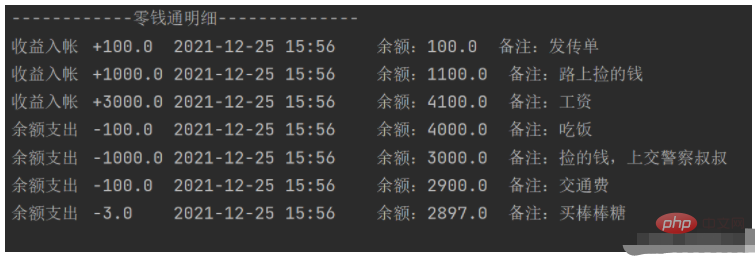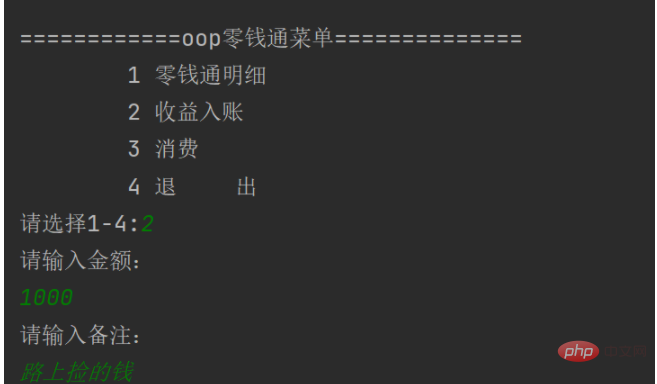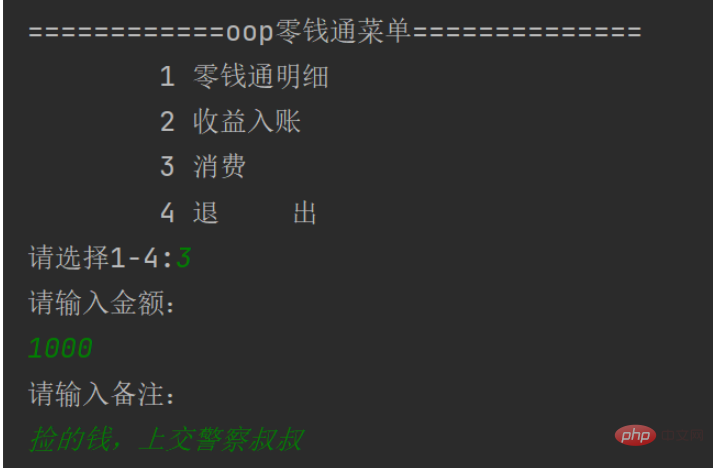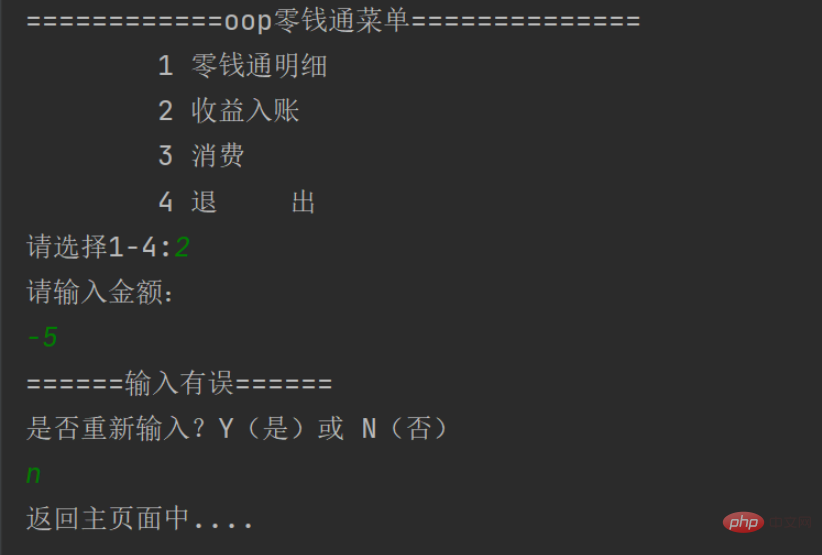How to implement Lingqiantong in Java
As shown in the picture:
Thoughts:
(1) You can record and consume income and save it in an array (but the array you have learned so far is of fixed length)
(2) You can use objects
(3) You can use String splicing
Complete the revenue entry, complete the function driver programmer to add new changes to the code
(1) To receive the amount of revenue entry, and update the balance
(2) Splice the characters String
(3) Find how to output the time, and modify its output format
The string splicing I used

Some instructions
Create a package com.project.money.oop
Then create two classes SmallChangeSys and SmallChangeSysOOP
SmallChangeSys is used to write the main method code as follows
package com.project.money.oop;
public class SmallChangeSys {
public static void main(String[] args) {
SmallChangeSysOOP p=new SmallChangeSysOOP();
p.menu();
}
}SmallChangeSysOOP is used to implement specific functions
The code is as follows:
package com.project.money.oop;
import java.text.SimpleDateFormat;
import java.util.Date;
import java.util.Scanner;
public class SmallChangeSysOOP {
private double in_money=0;//当前流动的钱
private double balance=0;//余额
private String detailed="------------零钱通明细--------------";
private Date date = null;
//可以用于日期格式化的
SimpleDateFormat sdf = new SimpleDateFormat("yyyy-MM-dd HH:mm");
public void menu(){};
//1 零钱通明细
public void detailed_(){};
//2 收益入账"
public void input(){};
//3消费
public void output(){};
}Specify the role of each method:
public void menu() method
public void menu(){//菜单
boolean loop=true;
Scanner scanner = new Scanner(System.in);
while(loop){//循环展示菜单
System.out.println("\n============oop零钱通菜单==============");
System.out.println("\t\t1 零钱通明细");
System.out.println("\t\t2 收益入账");
System.out.println("\t\t3 消费");
System.out.println("\t\t4 退" + "\t" + "出");
System.out.print("请选择1-4:");int key= scanner.nextInt();//选择;
switch (key){
case 1:detailed_();break;
case 2:input();break;
case 3:output();break;
case 4:System.out.println("\t\t程序已经退出");loop=false;break;
}
}
}void detailed_ () method
public void detailed_(){
System.out.println(detailed);//直接输出字符
}public void input() method
public void input(){//收益入账
Scanner scanner = new Scanner(System.in);
System.out.println("请输入金额:");
this.in_money=scanner.nextDouble();
while(in_money<0){
System.out.println("======输入有误======");
System.out.println("是否重新输入?Y(是)或 N(否) ");//可能点错了不是输入
String in=scanner.next();//是否重新输入
if(in.equals("n")||in.equals("N")){
System.out.println("返回主页面中....");
/*****************************************/
try {
Thread.sleep( 1000 );//暂停1秒提升用户感受
} catch (Exception e){}
/*******************************************/
return;//退出输入
}
System.out.println("请输入金额:");
this.in_money=scanner.nextDouble();
}
this.balance+=this.in_money;
String beizhu="";
date = new Date();
System.out.println("请输入备注:");
beizhu=scanner.next();
this.detailed+="\n收益入帐\t+" + this.in_money + "\t" + sdf.format(date) +
"\t余额:" + this.balance+ " 备注:" +beizhu;
}public void output() method
public void output(){
System.out.println("请输入金额:");
Scanner scanner = new Scanner(System.in);
in_money=scanner.nextDouble();
if(balance<in_money){
System.out.println("余额不足,请充值");
return;
}
while(in_money<0){
System.out.println("输入错误,请重输");
in_money=scanner.nextDouble();
if(balance<in_money){
System.out.println("余额不足,请充值");
return;
}
}
this.balance-=in_money;
System.out.println("请输入备注:");
String beizhu=scanner.next();
this.detailed+="\n余额支出\t-" + this.in_money + "\t" + sdf.format(date) +
"\t余额:" + this.balance+ " 备注:" +beizhu;
}SmallChangeSysOOP complete code
package com.project.money.oop;
import java.text.SimpleDateFormat;
import java.util.Date;
import java.util.Scanner;
public class SmallChangeSysOOP {
private double in_money=0;//当前流动的钱
private double balance=0;//余额
private String detailed="------------零钱通明细--------------";
private Date date = null;
//可以用于日期格式化的
SimpleDateFormat sdf = new SimpleDateFormat("yyyy-MM-dd HH:mm");
public void menu(){//菜单
boolean loop=true;
Scanner scanner = new Scanner(System.in);
while(loop){//循环展示菜单
System.out.println("\n============oop零钱通菜单==============");
System.out.println("\t\t1 零钱通明细");
System.out.println("\t\t2 收益入账");
System.out.println("\t\t3 消费");
System.out.println("\t\t4 退" + "\t" + "出");
System.out.print("请选择1-4:");int key= scanner.nextInt();//选择;
switch (key){
case 1:detailed_();break;
case 2:input();break;
case 3:output();break;
case 4:System.out.println("\t\t程序已经退出");loop=false;break;
}
}
}
//1 零钱通明细
public void detailed_(){
System.out.println(detailed);
}
//2 收益入账"
public void input(){//收益入账
Scanner scanner = new Scanner(System.in);
System.out.println("请输入金额:");
this.in_money=scanner.nextDouble();
while(in_money<0){
System.out.println("======输入有误======");
System.out.println("是否重新输入?Y(是)或 N(否) ");//可能点错了不是输入
String in=scanner.next();//是否重新输入
if(in.equals("n")||in.equals("N")){
System.out.println("返回主页面中....");
/*****************************************/
try {
Thread.sleep( 1000 );//暂停1秒提升用户感受
} catch (Exception e){}
/*******************************************/
return;//退出输入
}
System.out.println("请输入金额:");
this.in_money=scanner.nextDouble();
}
this.balance+=this.in_money;
String beizhu="";
date = new Date();
System.out.println("请输入备注:");
beizhu=scanner.next();
this.detailed+="\n收益入帐\t+" + this.in_money + "\t" + sdf.format(date) +
"\t余额:" + this.balance+ " 备注:" +beizhu;
}
//3消费
public void output(){
System.out.println("请输入金额:");
Scanner scanner = new Scanner(System.in);
in_money=scanner.nextDouble();
if(balance<in_money){
System.out.println("余额不足,请充值");
return;
}
while(in_money<0){
System.out.println("输入错误,请重输");
in_money=scanner.nextDouble();
if(balance<in_money){
System.out.println("余额不足,请充值");
return;
}
}
this.balance-=in_money;
System.out.println("请输入备注:");
String beizhu=scanner.next();
this.detailed+="\n余额支出\t-" + this.in_money + "\t" + sdf.format(date) +
"\t余额:" + this.balance+ " 备注:" +beizhu;
}
}Some pictures




The above is the detailed content of How to implement Lingqiantong in Java. For more information, please follow other related articles on the PHP Chinese website!

Hot AI Tools

Undresser.AI Undress
AI-powered app for creating realistic nude photos

AI Clothes Remover
Online AI tool for removing clothes from photos.

Undress AI Tool
Undress images for free

Clothoff.io
AI clothes remover

AI Hentai Generator
Generate AI Hentai for free.

Hot Article

Hot Tools

Notepad++7.3.1
Easy-to-use and free code editor

SublimeText3 Chinese version
Chinese version, very easy to use

Zend Studio 13.0.1
Powerful PHP integrated development environment

Dreamweaver CS6
Visual web development tools

SublimeText3 Mac version
God-level code editing software (SublimeText3)

Hot Topics
 1381
1381
 52
52
 Perfect Number in Java
Aug 30, 2024 pm 04:28 PM
Perfect Number in Java
Aug 30, 2024 pm 04:28 PM
Guide to Perfect Number in Java. Here we discuss the Definition, How to check Perfect number in Java?, examples with code implementation.
 Random Number Generator in Java
Aug 30, 2024 pm 04:27 PM
Random Number Generator in Java
Aug 30, 2024 pm 04:27 PM
Guide to Random Number Generator in Java. Here we discuss Functions in Java with examples and two different Generators with ther examples.
 Weka in Java
Aug 30, 2024 pm 04:28 PM
Weka in Java
Aug 30, 2024 pm 04:28 PM
Guide to Weka in Java. Here we discuss the Introduction, how to use weka java, the type of platform, and advantages with examples.
 Smith Number in Java
Aug 30, 2024 pm 04:28 PM
Smith Number in Java
Aug 30, 2024 pm 04:28 PM
Guide to Smith Number in Java. Here we discuss the Definition, How to check smith number in Java? example with code implementation.
 Java Spring Interview Questions
Aug 30, 2024 pm 04:29 PM
Java Spring Interview Questions
Aug 30, 2024 pm 04:29 PM
In this article, we have kept the most asked Java Spring Interview Questions with their detailed answers. So that you can crack the interview.
 Break or return from Java 8 stream forEach?
Feb 07, 2025 pm 12:09 PM
Break or return from Java 8 stream forEach?
Feb 07, 2025 pm 12:09 PM
Java 8 introduces the Stream API, providing a powerful and expressive way to process data collections. However, a common question when using Stream is: How to break or return from a forEach operation? Traditional loops allow for early interruption or return, but Stream's forEach method does not directly support this method. This article will explain the reasons and explore alternative methods for implementing premature termination in Stream processing systems. Further reading: Java Stream API improvements Understand Stream forEach The forEach method is a terminal operation that performs one operation on each element in the Stream. Its design intention is
 TimeStamp to Date in Java
Aug 30, 2024 pm 04:28 PM
TimeStamp to Date in Java
Aug 30, 2024 pm 04:28 PM
Guide to TimeStamp to Date in Java. Here we also discuss the introduction and how to convert timestamp to date in java along with examples.
 Java Program to Find the Volume of Capsule
Feb 07, 2025 am 11:37 AM
Java Program to Find the Volume of Capsule
Feb 07, 2025 am 11:37 AM
Capsules are three-dimensional geometric figures, composed of a cylinder and a hemisphere at both ends. The volume of the capsule can be calculated by adding the volume of the cylinder and the volume of the hemisphere at both ends. This tutorial will discuss how to calculate the volume of a given capsule in Java using different methods. Capsule volume formula The formula for capsule volume is as follows: Capsule volume = Cylindrical volume Volume Two hemisphere volume in, r: The radius of the hemisphere. h: The height of the cylinder (excluding the hemisphere). Example 1 enter Radius = 5 units Height = 10 units Output Volume = 1570.8 cubic units explain Calculate volume using formula: Volume = π × r2 × h (4





